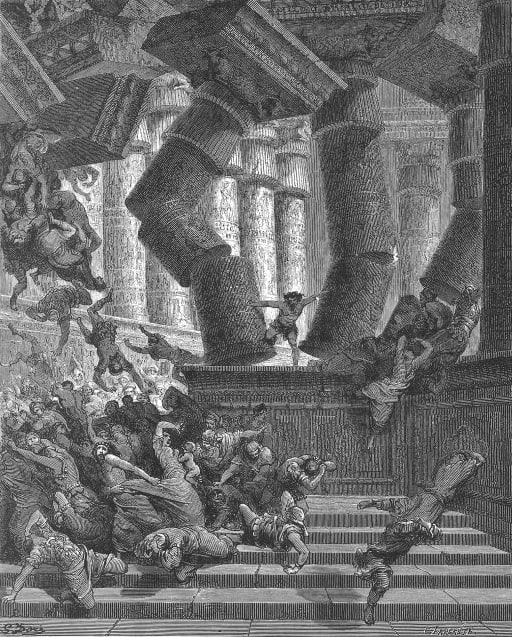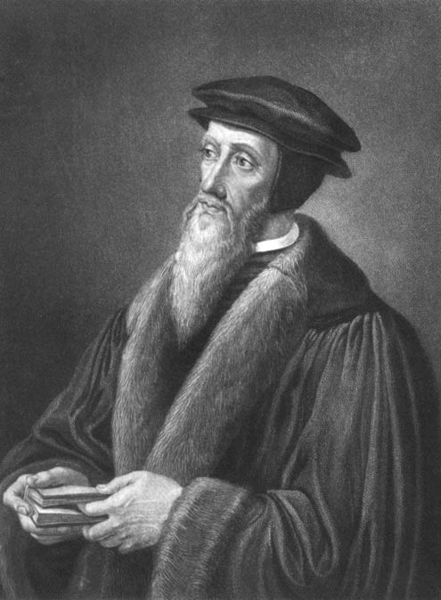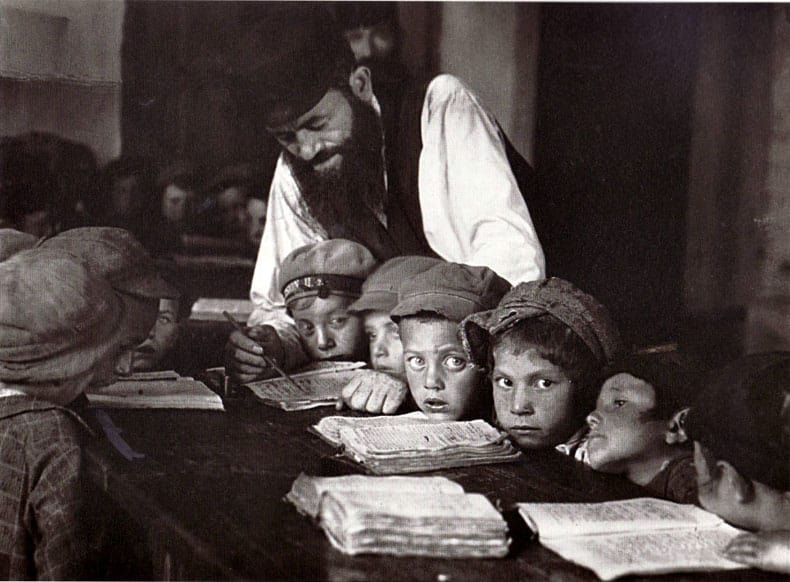
Why Samson is a Hero of Faith
As we read the story of Samson in the Book of Judges it is hard not to notice the distresses he went through. At the same time we wonder “How come Samson is mentioned in Hebrews chapter 11 as a hero of faith?” Most of preachers or commentators that I read would give explanation such as “Samson did not give up trusting/believing God till the end.” But that doesn’t seem to be an enough reason to be cited as a hero of faith, considering the overall teachings of the Bible.
The question regarding Samson’s faith was finally answered in a very important stage in my life through the published sermons of Dr. Hong-chun Kim. Many thanks to God for sending a preacher like Dr. Kim to the Church. His sermons helped me tremendously in appreciating the historic reformed faith.
In this post, I will try to summarize and translate what I understood as the main points in Dr. Kim’s exposition. It will inevitably reflect my understanding; so if there is any mistake, it is due to the error in my part. I encourage you to read Dr. Kim’s original sermon which is much more detailed and thorough. (At this point, there is no English translation of it.)
The state of the church in our day and age is not too different than that of the days of Samson. May our Lord Jesus Christ bless us in reading the story of Samson, open our eyes, and allow us to see the necessity of the faith that Samson had.
One of the most important message of the Scriptures that we must firmly grasp is the Christian calling in Christ and its relation to the Body of Christ, namely, the Church. One must acknowledge that we were delivered from the domain of darkness (Col 1:13) so that we may live and die for Christ (Rom 14:8) as a member of His body (Eph 4:16). This is also necessary to see the significance of Samson’s life. The following questions are also important to in this line:
- What was the state (condition) of Israel like at the time of Samson? What was her moral, political, religious state?
- How did such state of Israel relate to Samson? What was his thought on it?
- What was the reason for God not allowing the Israelites getting married with Canaanites? What is the proper manner in observing such commandment that matches its purpose?
- How does certain basic aspects of life, such as marriage and family, relate to the Christian calling?
The State (Condition) of Israel
First, the spiritual state. It was hard to find among the Israel a proper attitude that one should take before God. In particular, they have forgotten their calling as the Church of the Old Testament.
Their social, political, and moral status were also very low. Partially owing to the assuage of the Philistines, Israelites were immersed in contentment. They would not seek higher things (such as their calling as the Church) as long as their basic needs were satisfied. And as long as the Philistines did not interfere with their basic needs of life, the Israel people were content with the overall situation, wishing that “We would like to live like this, quietly and without trouble.” This is a very depraved state; lethargic as if addicted to a drug; in such a state, things like “calling” or “purpose of existence” has no meaning.
Philistines were using ethnic policy which made harder for Israelites to examine themselves. Philistines would make arrange conflict within Israel; by giving privileges to those Israelites who had no critical mind, and having them marry with Philistines; but persecuting those few that are rebellious with a Hebrew mind. Under such policy, Israel had very faint idea on national calling, hope, or spirit.
In such a state, they had no desire to seek a “savior”. Even if they tried, they weren’t sure whether there would be any savior. So they rather hoped to be content maintaining their current state. Yet, God would save them. His answer was Samson.
Samson and Israel
But Samson was greeted with cold reception and isolation from Israel. No one welcomed him.
Of course, there were people who were religious — but only at personal level — like the parents of Samson, who obeyed the command of God to raise Samson as a Nazarite. But we don’t see anyone recorded in the Scripture, other than Samson, who were aware of the greater than calling, the calling beyond the personal level, the calling as the Church. An important lesson we earn here is that although a person can be serious about faith, that doesn’t necessarily mean that person has a sure acknowledgement of the Kingdom of God and its calling. He or she might know that God is great, but could fail to realize why he or she was sent to this earth and what he or she should be doing.
In other words, there were many ‘individual’ believers in Israel, but there were no vitality as the Church.
In order for the Church to have here vitality, her members (individuals) must have something more in their mind. If all we can find is “I will trust God and live according to His grace as an individual,” if that is all there is, then the Church cannot maintain its vitality. Even an isolated person like Robinson Crusoe can have such an attitude.
The Vitality of the Church and the Acknowledgement of the Ecclesial-Self
For the Church to have her vitality as the Church, there must be people that has the proper mindset — “The reason God sent us to the earth is not just to have individuals exercising trust in God as a personal religion so that each one could receive God’s blessings and go to the paradise. We have the great commission, to testify His holy plan and economy (oikonomia). We must know what it is, and do what we must do in a manner that is most fit to our day and age.”
Even the secular world teaches the Social-Self. Christians must all the more realize that “I am not alone.” We must acknowledge that “I do not exist alone. The very fact that I am united with Christ to His life implies that I do not exist alone; the members of the body of Christ are there, whether they are visible to me. That is the Church. It is an eternal and universal church. When it is visible to me, when I am with them, there is the visible church.”
Samson’s Calling
But Israel people did not have such acknowledgement of the Ecclesial-Self; into such condition was Samson sent. Hence it was easy for the Israelites to respond with the attitude “Where is the need to raise your voice like that? Isn’t it enough for each person to believe God and live according to their own convictions? Who are you to tell others what to do?” A very cold reception.
Yet, the great calling of Samson as an Ecclesial-Self — which is not unrelated to the calling of Christians of our day and age — was never to boast his powers to the world; his calling was for the Church; “Save the Israel people; save this Church.” Samson gave up his life to that end. The reason he is counted as a hero of faith in spite of his follies is because he lived and gave his life for that important calling he received. That is the greatness of Samson. Put in another way, an individual becoming a saint is not the greatest thing. Anyone who is not afflicted by others and left alone can behave as a saint.
When the Bible calls someone a hero of faith, it doesn’t examine whether that person had any quarrels with other people; rather, it examines how much that person has actively contributed to God’s holy Kingdom, His Church. Samson was at service to that. He did slip and fall while doing it; but he never quit and at the end gave his life for that commission. Samson is known to have killed many during his life; but the dead whom he killed by collapsing the pillars when he was being mocked at the feast were more than those he had killed during his life. It seems almost all prominent figures of Philistine were there at the feast. So it was no ordinary occasion. God granted Samson the strength so that he could accomplish what he did at that moment, and Samson used that granted grace and gift properly. Samson was not in a situation where he could do whatever he wished. But he prayed “Lord, please strengthen me,” repenting his err, and when God revived him so that he could serve the calling once more, he did the best that was in him to used that chance. That is why he is a honored. That is the admirable part.
Some philosophers say that “If you are not an influential person, then it is enough to live a kind and moral life.” But Christianity does not teach that; rather it teaches “Whether you are influential, regardless of that, you shall walk under the grand purpose and calling.”
What was Samson like in this regard? He was not eminent. He was not like Gideon who had at least 300 men following him. Not even 3 men helped Samson. He was always alone and lonely. Yet, he did not think it is enough to lead a personal moral life; he wanted to rescue Israel and put her in proper position, and that was his thought that lead him till the end.
Samson as a shadow of Christ
So we see that, in the big picture, Samson was a shadow of Christ, in that he was sent by God to save His people, rejected by his own people, and gave his life at the end to save them.
Samson’s Marriage
Finally, a few words about Samson’s marriage. Samson wanted to marry, not just any Gentile woman, but a Philistine woman. So there is a political motive behind it, and it seems that God approved (or at least tolerated) that move: “His father and mother did not know that it was from the LORD, for he was seeking an opportunity against the Philistines.” (Judges 14:4)
So why was that allowed to Samson? To answer this, we must remember what Bible teaches us as the most important value to man. A good answer comes from the Westminster Larger Catechism: “Question 1: What is the chief and highest end of man? Answer: Man’s chief and highest end is to glorify God, and fully to enjoy him forever.”
It is easy to criticize Samson’s marriage based on Romanticism. But Romanticism is to praise humanistic values; it has no consideration on values that God considers as most important.
So then, what is the meaning of ‘family’? Family was instituted by God because He thought that “It is not good that the man should be alone; I will make him a helper fit for him.” Thus, a family exists to bear the image of the holy Church. So a person who is aware of the Ecclesial-Self puts and considers the family as part of the Church. Indeed, where 2 or 3 people gather in the name of Christ, there is the Communion of the Saints (Matt 18:20). Now, to do anything “in the name of Christ” is to do anything “bound by Christ’s heart and thoughts;” Christ’s name represents the whole person of Christ; that should be in our hearts as a foundation when we gather “in His name”.
So then, a family cannot exist meaningfully apart from the grand purpose of God’s holy Kingdom, the holy Church. And ‘family’ is a mean to serve that calling. We shouldn’t take Samson’s example as a typical mode. But, although his marriage was political, he was trying to use the institution of marriage to serve his calling effectively.
Now, it is not that God prohibited marrying gentiles as if such marriage is intrinsically a sin; rather, God prohibited Israelites from it because such marriage could hinder the their minds and attitudes as His called people. Even a Canaanite woman, if she comes before the Lord to serve Him — like Ruth — she could be admired more than any other Israel women. This is another thing to keep in mind when considering Samson’s marriage.




One Comment
Pingback: